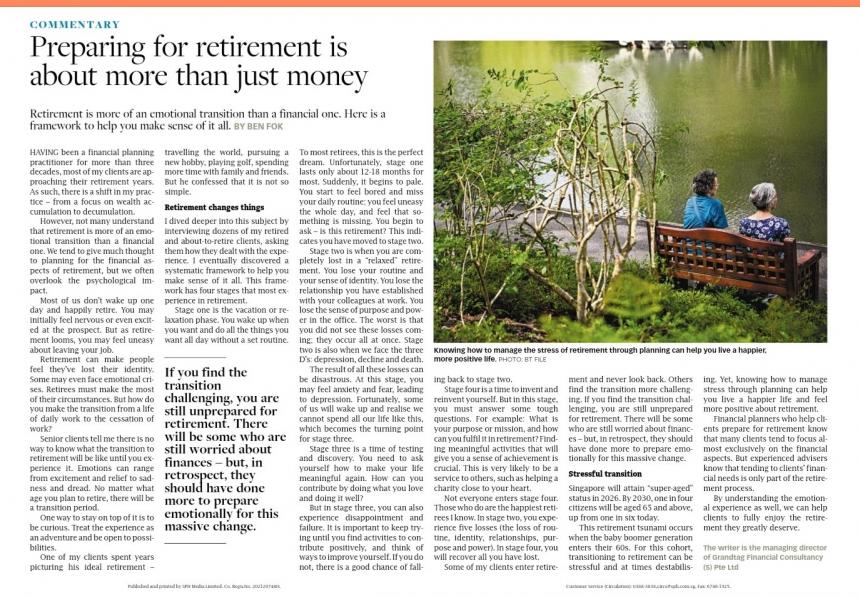You are here
Back to top
News
“Preparing for retirement is about more than just money” written by Dr. Ben Fok, featured in the Business Times (English Only)

[Singapore, Aug 2023] A commentary written by Dr. Ben Fok, Managing Director of Grandtag Financial Consultancy (“Grandtag”), featured in the Business Times addresses the importance of managing retirement stress through planning to prepare for a happier, more positive life:
Retirement is more of an emotional transition than a financial one. Here is a framework to help you make sense of it all.
Having been a financial planning practitioner for more than three decades, most of my clients are approaching their retirement years. As such, there is a shift in my practice – from a focus on wealth accumulation to decumulation.
However, not many understand that retirement is more of an emotional transition than a financial one. We tend to give much thought to planning for the financial aspects of retirement, but we often overlook the psychological impact.
Most of us don’t wake up one day and happily retire. You may initially feel nervous or even excited at the prospect. But as retirement looms, you may feel uneasy about leaving your job.
Retirement can make people feel they’ve lost their identity. Some may even face emotional crises. Retirees must make the most of their circumstances. But how do you make the transition from a life of daily work to the cessation of work?
Senior clients tell me there is no way to know what the transition to retirement will be like until you experience it. Emotions can range from excitement and relief to sadness and dread. No matter what age you plan to retire, there will be a transition period.
One way to stay on top of it is to be curious. Treat the experience as an adventure and be open to possibilities.
One of my clients spent years picturing his ideal retirement – travelling the world, pursuing a new hobby, playing golf, spending more time with family and friends. But he confessed that it is not so simple.
Retirement changes things
I dived deeper into this subject by interviewing dozens of my retired and about-to-retire clients, asking them how they dealt with the experience. I eventually discovered a systematic framework to help you make sense of it all. This framework has four stages that most experience in retirement.
Stage one is the vacation or relaxation phase. You wake up when you want and do all the things you want all day without a set routine. To most retirees, this is the perfect dream. Unfortunately, stage one lasts only about 12-18 months for most. Suddenly, it begins to pale. You start to feel bored and miss your daily routine; you feel uneasy the whole day, and feel that something is missing. You begin to ask – is this retirement? This indicates you have moved to stage two.
If you find the transition challenging, you are still unprepared for retirement. There will be some who are still worried about finances – but, in retrospect, they should have done more to prepare emotionally for this massive change.
Stage two is when you are completely lost in a “relaxed” retirement. You lose your routine and your sense of identity. You lose the relationship you have established with your colleagues at work. You lose the sense of purpose and power in the office. The worst is that you did not see these losses coming; they occur all at once. Stage two is also when we face the three D’s: depression, decline and death.
The result of all these losses can be disastrous. At this stage, you may feel anxiety and fear, leading to depression. Fortunately, some of us will wake up and realise we cannot spend all our life like this, which becomes the turning point for stage three.
Stage three is a time of testing and discovery. You need to ask yourself how to make your life meaningful again. How can you contribute by doing what you love and doing it well?
But in stage three, you can also experience disappointment and failure. It is important to keep trying until you find activities to contribute positively, and think of ways to improve yourself. If you do not, there is a good chance of falling back to stage two.
Stage four is a time to invent and reinvent yourself. But in this stage, you must answer some tough questions. For example: What is your purpose or mission, and how can you fulfil it in retirement? Finding meaningful activities that will give you a sense of achievement is crucial. This is very likely to be a service to others, such as helping a charity close to your heart.
Not everyone enters stage four. Those who do are the happiest retirees I know. In stage two, you experience five losses (the loss of routine, identity, relationships, purpose and power). In stage four, you will recover all you have lost.
Some of my clients enter retirement and never look back. Others find the transition more challenging. If you find the transition challenging, you are still unprepared for retirement. There will be some who are still worried about finances – but, in retrospect, they should have done more to prepare emotionally for this massive change.
Stressful transition
Singapore will attain “super-aged” status in 2026. By 2030, one in four citizens will be aged 65 and above, up from one in six today.
This retirement tsunami occurs when the baby boomer generation enters their 60s. For this cohort, transitioning to retirement can be stressful and at times destabilising. Yet, knowing how to manage stress through planning can help you live a happier life and feel more positive about retirement.
Financial planners who help clients prepare for retirement know that many clients tend to focus almost exclusively on the financial aspects. But experienced advisers know that tending to clients’ financial needs is only part of the retirement process.
By understanding the emotional experience as well, we can help clients to fully enjoy the retirement they greatly deserve.
Read the full article: https://www.businesstimes.com.sg/wealth/preparing-retirement-about-more-just-money

